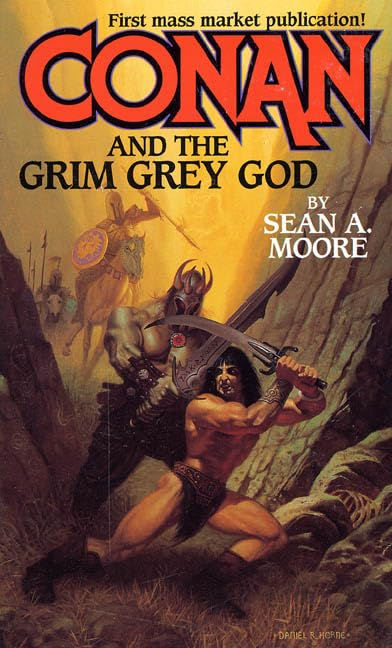Marchers of Valhalla was better
- Greg O'Driscoll
- Feb 1, 2024
- 3 min read

Love that cover by Gil Kane and Ernie Chan with Chan's trademark heavy rendering and Kane's classic composition, complete with that one guy who is always turned around the wrong way to face the reader. Whether he is trying to yell for help or to croak out a death gurgle usually depends upon the expression on his face and the placement of his hands. This guy looks wounded, possibly dying.
"The Secret of Ashtoreth" is the finishing half of a two-part tale which converted Robert E Howard's Marchers of Valhalla into a Conan adventure. While it lacks something of the sweep, tragedy, and grim worldview of the original, the Buscema and Chan art is still really singing here. Escaping from their impending sacrifice by Akkheba the high priest of Kelka, Conan and Belit discover the immortal Astarta, held captive in a high tower. Mistaken for the goddess Ashtoreth centuries ago by the people of the doomed city, the captive "goddess" now tells her tale of woe to the two pirate leaders. If the sea-god that once granted her immortality would answer her cries, then the whole city would rightly tremble.
Belit's crewman Kawaku proves by turns to be cowardly, bloodthirsty, disloyal, and either greedy or headstrong, possibly both. In spite of all this Conan knocks the corsair out and drags him from the drowning city, saving the man's life. Not that the craven Kawaku will show any gratitude for it in future issues, quite the opposite as one might expect.
Unable to stay away from such an easy target, Auro and the Barachan pirates return to the city, thanks once again to Kawaku. His attack lends to the general chaos, and he later promises Belit a rematch upon the open seas if the Black Corsairs and her ship the Tigress ever venture out onto the open ocean. I will have to double check, but I don't believe the promised rematch ever occurred. Conan claims his own vengeance against the treacherous priest that hired he and Belit's swords and then played them false, leading to one of my favorite exchanges from the issue:
Akkheba: "No-- please! Have pity on an old man! I am a man of the gods--!"
Conan: "You hide behind them, merely-- and make them dirtier for your touching their cloaks. I'll give you but a moment to pray to them to receive your lice-ridden soul-- provided you believe in them at all!"
Astarta summons the sea-god in the form of relentless crashing waves. The city is destroyed by the sea but the corsairs escape to pursue further adventures in the future. Marchers of Valhalla had a much less happy ending. Everyone died, except for the immortal Astarta (Ishtar). Hialmar's death is particularly touching. The Aesir warrior's failed attempt to save Aluna, which only made it into this version of the tale in a muted form (Conan trying to save the blonde slave of the priests from sacrifice), seemed to highlight the futility of a life that knew only war and nothing of love.
Speaking of love, it is worth noting that Belit's possessiveness and jealousy are on full display in this issue. It is one of her less appealing character traits, but makes the pirate woman a balanced and realistic figure. She is explicitly the commander of her ship the Tigress and accustomed to being obeyed by the men around her until Conan came into her life. Belit constantly suspected and accused Conan of having ulterior motives for wanting to rescue Aluna




Comments